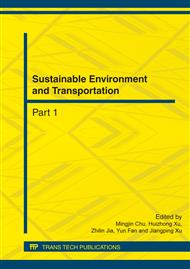[2]
After the extraordinarily serious marine perils on November 24, 1999, the administration took many measures to prevent such accidents based on the actual conditions. For instance, the wind resistance scale system is established in 2000. It provides that the shipping enterprises should set the safety scale for all ships and should get the approval from the administration. [3] Take the vessel Shengsheng 1 as the example. This vessel cannot set sail when the wind scale exceeds 8. The influence of wind to ro-ro passenger ship is shown in Table 4. Table 4 1/10 Maximum roll angle in different wind scale for different loading states Beaufort Scale 4
Beaufort Scale 5
Beaufort Scale 6
Beaufort Scale 7
Beaufort Scale 8
Beaufort Scale 9
Beaufort Scale 10
Full load Departure
5.5°
11.2°
18.0°
25.0°
28.0°
31.0°
34.0°
Full load Arrival
5.6°
11.4°
18.4°
25.6°
28.5°
31.7°
34.6°
Ballast Departure
5.8°
11.7°
18.9°
26.2°
29.6°
32.7°
35.5°
Ballast Arrival
6.0°
12.1°
19.2°
27.1°
29.9°
33.0°
36.4°
As shown in Table 4, the roll angle gradually increases with the increasing of wind scale. The ship is in danger when the Beaufort scale increases to 8. The roll angles in different courses are shown in Table 5. Table 5 Changes of Roll angles in different courses Course Angle
Maximum Roll Angle
1.7°
4.0°
6.5°
16°
11°
8.9°
2.8° As shown in Table 5, when the vessel parallels with the wave, the roll angle reaches the maximum. When the vessel heads and follows the waves, the roll angles decrease. Problems in Weather Forecast The theory and practice prove that the heavy wind and wave is the major element which can influence the seaworthiness. The influence of wind account for about 1/3, and the wave account for about 2/3. The wind forecast is accurate, and the wave is not. When the wind is heavy and the wave is little, the vessel anchors. When the wind is little and the wave is heavy, the vessel sets sail. Therefore, the vessel encounters heavy wave. The coastal observatories do the weather reports for Bohai Bay. Sometimes, the reports of these observatories for wind are quite different. For instance, one observatory reports that the wind scale is 6-7, and another one reports that the scale is 7-8, which confuses the shipping enterprises and captains. Accuracy rate of weather forecast remains to be improved, especially for the accuracy rate of heavy weather. The report frequency also cannot meet the requirements of ro-ro passenger ship. Countermeasures Based on these conditions, some measures can be taken to ensure the safety on the voyage. Under the coordination of National Meteorological Bureau, strengthen the cooperation of observatories. Establish special organization to do accurate and uniform weather report in Weihai-Dalian Route. The Ministry of Transport can make suggestions to the National Meteorological Bureau to set up float automatic weather station in the Bohai Channel. Meanwhile, the ro-ro passenger ships sailing in Weihai-Dalian route can perfect their meteorological instruments to observe the weather conditions accurately. Then, the data from observation can be sent to related observatory to help the forecaster. Train the captains, who are working in the ro-ro passenger ships sailing in the Weihai-Dalian Route, to master knowledge about meteorology, sea conditions, synoptic chart in Weihai-Dalian route. Improve the captain's judgment for heavy weather, ability for applying the weather forecast products appropriately, and ability for decision-making. Reference:
Google Scholar
[1]
Tao Liu, Liping Gao, Yongxin Song. Safety of Ro-ro Passenger Vessels in Bohai Bay. Dalian, Journal of Dalian Maritime University, (2006)
Google Scholar
[2]
IMO file,"IMO and Ro-Ro safety","Focus on IMO".Jan.(2003)
Google Scholar
[3]
Lixiong Chen. Study on the Meteorological and Marine Conditions Influencing the Navigation Safety of Roll-Roll Passenger Ship on Bohai Sea. Dalian Maritime University, (2004)
Google Scholar


